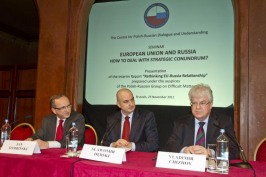Dear friends,
Let me start by congratulating the twin new-born establishments in Warsaw and Russia devoted to promoting dialogue and understanding, as well as the Russian-Polish Group on Difficult Matters for organising this event – the presentation of the report “Rethinking EU-Russia Relationship”. I appreciate the possibility to address this distinguished audience.
It is with great interest that I have read this report. To be accurate, I had the opportunity to familiarize myself only with an interim version. So let me share with you some preliminary, interim thoughts on it.
Every relationship, which is, or pretends to be long-lasting, mature and mutually beneficial, is never rid of difficult matters. What is important is how they are tackled.
Needless to say, such significant geopolitical entities as Russia and the EU are doomed to always have issues to resolve. I as the Russian Permanent Representative to the EU am probably better aware of this fact than anybody else. One of the main tasks of our diplomacy in relations with the EU is not to avoid difficult matters, but to create and steadily improve channels, instruments and “technologies” for dealing with them. This is why I consider this report as a valuable contribution aimed at adding quality to the Russia-EU strategic partnership.
Of course, with all due respect to the authors, I cannot entirely agree with all the views and recommendations contained in your paper. To a certain degree it reflects the current standpoint in our cooperation with our EU partners: sometimes we agree, sometimes disagree, sometimes agree to disagree. This report is certainly a result of collective work, with necessary compromises and intended omissions. As head of the Russian team at the negotiations on the New Basic Agreement I know this business quite well.
I am sure that the new reality already pushes Russia and the EU closer together. And of course, I share the opinion that more than ever the position of the EU and Russia in the global order will be – actually already is – decided by developments inside our economies and societies. With this in mind we are gradually launching a dialogue on "coupling" the concepts of economic and social development in Russia and the EU until 2020. I remember the initial EU reaction to our proposal to put on the agenda of the Russia-EU Summit held in Khanty-Mansiysk in June 2008 the issue of global economic situation, including economic policies of the EU. Now it is a regular, if not central, item in our discussions at many levels.
To make our economies more competitive is the main goal behind the “Russia-EU Partnership for Modernisation” as an initiative with a “two-way traffic”. It is not only about modernising Russia, but also – and much more so – about upgrading our cooperation in a broader sense of this notion.
I would like to thank the authors of the report for some fairly subtle observations. Indeed, security area as a field of cooperation with the EU requires strategic patience, especially from countries like Russia. Russia remains fully committed to the principle of indivisibility of security, our initiatives on developing a Treaty on European Security and the joint proposal by Russia and Germany to establish a Russia-EU Committee on External Policy and Security (the Meseberg memorandum) are still on the table. We are prepared to continue working towards a Russia-EU agreement in the sphere of crisis management.
One of the essential ideas in this report, in my opinion, is that differences of views in Russia-EU relations are no longer ideological and relate to specific interests and issues. I cannot say that we are already there, but pragmatic approach is gaining ground, especially against the background of the global financial and economic crisis.
Certainly, there is a huge untapped potential in our relations, albeit the progress achieved in the last years is significant. But I doubt that we need a rethinking of the relationship. What is really useful is regular review and analytical support assisting in exploring new avenues of cooperation. The presented report is a good food for thought. Let me thank the authors and express the hope that this work on difficult matters in the Russia-EU relations will be continued. As a follow up I would be glad to see, for example, an analysis of possible ways of transforming our predominantly consultative mechanisms of cooperation into really decision-making bodies or a study on how to create necessary conditions for promoting in a mutually beneficial and complementary manner the existing integration processes in Europe.























